|
|
| |
| EVENTS |
|
|
> Public Representatives urged to Monitor and Oversee the National Emergency Action Plan 2011
- In 2011, 24 cases of polio detected across Pakistan which is twice as compared to 12 in same period in 2010
- Lake of coordination among Legislators and bureaucracy is a big hurdle
|
|
|
|
| |
Islamabad, March 28: In a PILDAT arranged National workshop on the National Emergency Action Plan 2011 for Polio Eradication, Parliamentarians and MPAs from all Provincial Assemblies believed that public representatives should effectively monitor and oversee the National Emergency Action Plan 2011 for Polio eradication. �To eradicate polio a nation- wide awareness campaign should be launched with effective participation of Parliamentarians and media,� said experts in the National Workshop. A strategy through which both public representatives take a pro-active role in overseeing the programme as well as Federal and Provincial Governments inform legislators ahead of campaigns to ensure legislators involvement and oversight is crucial to ensuring the success of the National Emergency Action Plan, said Parliamentarians and MPAs. In 2011 so far 24 cases of polio have been detected across Pakistan which is twice as compared to 12 in the same period in 2010 � an alarming scenario believed experts and legislators, and requires effective measures to counter the spread as well. |
|
| |
Ms. Fozia Ejaz Khan, MNA and Vice President Parliamentary Caucus on Immunization, chaired the session. Other speakers included Mr. Tariq Fazal Choudhary, MNA, General Secretary Parliamentary Caucus on Immunization, Mr. Wazir Baig, Speaker, Gilgit Baltistan Legislative Assembly, Dr. Abdul Khaliq Achakzai, MPA and Provincial Minister for Youth Affairs, Balochistan, Dr. Asad Ashraf, MPA, Convener, Parliamentary Caucus to promote Immunization In the Provincial Assembly of the Punjab, Mr. Anwar Ahmed Mehar, MPA, Convener, Parliamentary Caucus to promote Immunization in the Provincial Assembly of Sindh, Mr. Moin Aamir Pirzada, Convener, Parliamentary Caucus to promote Immunization in the Provincial Assembly of the Sindh, Dr. Azhar Abid Raza, Health Specialist, UNICEF, Mr. Agha Ishfaq, Deputy National Programme Manager, EPI, Government of Pakistan and Ms. Aasiya Riaz, Joint Director PILDAT.
|
|
| |
Ms. Fozia Ejaz Khan stressed on the need for public representatives to take interest and work in their own areas to make immunization campaign a successful mission. �Media should run effective awareness campaigns especially an on FM radio that is the main source of information in FATA and other remote areas,� she added. Till we all work on this eradication mission as a national duty regardless of pay and perks and remuneration, unfortunately, this too shall remain a disaster, she said. While chairing the session she said that small pockets of areas should be targeted and campaigns should run in periodic manner to make it more result oriented. She stressed on revision of the honorarium for the field workers associated with the polio campaigns. Religious leaders should be involved in awareness campaigns to overcome misconceptions. |
|
| |
Dr. Azhar Abid Raza, while speaking on the occasion, said that Pakistan is one of the only four (4) countries in the world where polio still exists and Pakistan is the only country where number of polio cases is rising as seen in 2010. He told that 144 polio cases were found in 40 districts across Pakistan in 2010 while during the same period last year in Afghanistan 4 cases were found, 12 cases were detected in India and only I case was found in Nigeria. In 2011, while not a single case has been detected so far in any of these countries, Pakistan has already seen 24 reported as compared to 12 in same period last year. He believed that persistent operational challenges include security and access in FATA, KPK, and Balochistan, increasing fatigue, service delivery and quality, accountability and lake of awareness are major challenges though he believed if public representatives put their weight behind the campaign and effectively oversee and coordinate, Pakistan too can stop the spread of this virus. |
|
| |
Talking on the strategies to implement the National Emergency Action Plan, Agha Ishfaq, briefed that FATA, Central Punjab, Quetta, Qilla Abdullah, Karachi, Hyderabad and Jacobabad are high risk areas in Pakistan. He believed that polio coverage in far off areas is not satisfactory which needs to be addressed properly. He said that migrated population is yet another source of polio virus transmission. He admitted that over 250,000 children are still inaccessible in FATA. He stressed that a plan on districts level should be prepared which should be focused on local needs. Campaigns for 33 high risk districts was launched in 2010 but there is still 1% missed areas in KPK, Balochistan and Sindh while missed areas in FATA are 2%, said Agha Ashfaq in his presentation. |
|
| |
Mr. Tariq Fazal Choudhary, MNA appreciated PILDAT for highlighting issue of such national importance. He believed that it is not necessary that all polio cases are reported across Pakistan and the ground realities could be much more drastic as presented by the experts today. He stressed that health departments need to coordinate campaigns with public representatives and it�s a sorry state of affairs that despite efforts, effective coordination is still missing in this crucial area. |
|
| |
Mr. Wazir Baig said that all our efforts should be continued to eradicate polio from Pakistan as well as to maintain polio-free status of areas such as Gilgit-Baltistan. He said that no polio case has been registered in Gilgit Baltistan for some years due to the efforts made by health department and NGOs. He said that legislators of Gilgit Baltistan are also actively involved in polio campaigns. |
|
| |
Dr. Abdul Khaliq Achakzai, believed that of the spread of polio in Pakistan should be declared as the most important national emergency. He believed that in Balochistan, Qilla Abdullah is marked as high risk area because it is on the border of Afghanistan and the union councils in which these cases were reported, all are on the border. He believed that the people have misconceptions about polio vaccination which need to be addressed. He said that health department never involves public representatives in immunization campaigns. He stressed that far flung and border areas should be given special attention. |
|
| |
Dr. Asad Ashraf believed that until all children of Pakistan are not vaccinated we should not relax. He said all the countries except 3 Muslim countries are polio-free except India and in India the most hit province is Bihar which is a Muslim majority province. He believed that it is because of misperceptions among Muslims regarding polio vaccine. He especially shed light on Government of Punjab�s lead in testing polio vaccination and then making sure only effective and quality vaccine is used in Pakistan.
Mr. Anwar Ahmed Mehar was of the opinion that if polio is decreasing in Afghanistan why it is on rise in FATA. He said that awareness campaign is the most important factor in the efforts of eradicating polio and public representative can play a very important role in this regard. He stressed that misconceptions can also be removed by creating awareness among masses.
Mr. Moin Aamir Pirzada believed that public representative should take a pro-active role and personally get involved in polio eradication campaign, demand from health officials to inform them ahead of campaigns and personally be part of campaigns. It is unlikely that once effective oversight of representatives is there, virus could still spread.
Introducing the Session, Ms. Aasiya Riaz, Joint Director-PILDAT, said that PILDAT has facilitated the formation of Immunization Caucuses for National and Provincial Legislatures in order to facilitate the public representatives and to enhance their awareness and involvement into immunization campaigns. The continued transmission of poliovirus in Pakistan has become a national emergency. Pakistan now risks becoming the last remaining reservoir of endemic poliovirus transmission in the world, and the only remaining threat to achieving global polio eradication. In the light of the situation and its national and global implications, the President of Pakistan has directed the immediate development of an emergency action plan for polio eradication in Pakistan. The Goal of the Emergency Action Plan is to stop transmission of polio in Pakistan by the end of 2011. PILDAT�s objective of holding the National Workshop on the National Emergency Action Plan 2011 to Eradicate Polio is to discuss the importance and need of the plan, to review the strategies for its successful implementation, to identify what role Parliamentarians can play for the success of the plan and to sensitize the civil society and media on this serious issue. She thanked honourable public representatives who especially travelled from across Pakistan to be part of the Workshop. |
|
| |
|
|
| |

|
|
| |
|
|
| |

|
|
| |
|
|
| |
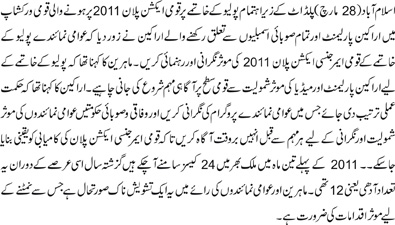
|
|
| |
|
|
| |
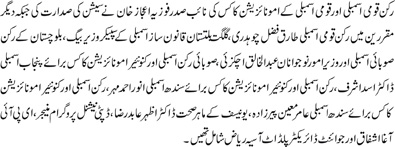
|
|
| |
|
|
| |
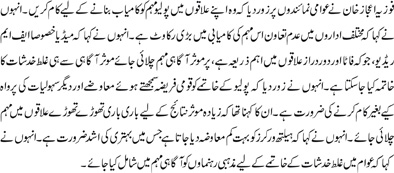
|
|
| |
|
|
| |
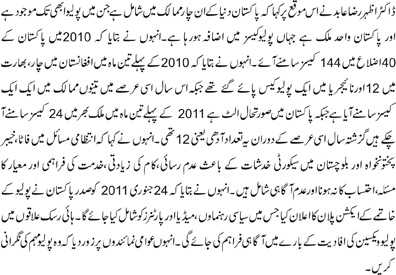
|
|
| |
|
|
| |
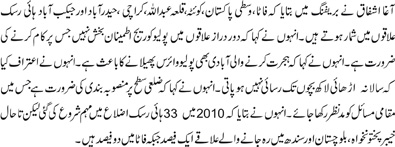
|
|
| |
|
|
| |

|
|
| |
|
|
| |
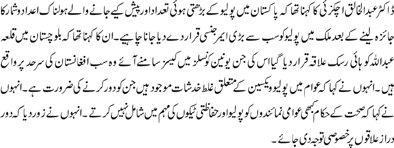
|
|
| |
|
|
| |

|
|
| |
|
|
| |

|
|
| |
|
|
| |

|
|
| |
|
|
| |

|
|
| |
|
|
| |

|
|
| |
|
|
| |
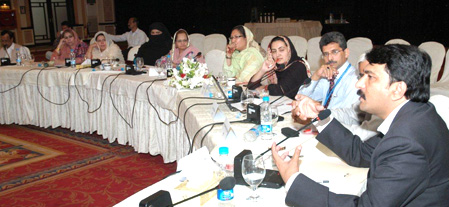
|
|
| |
|
|
| |

|
|
| |
|
|
| |

|
|
|
|
|
|
|
|
|